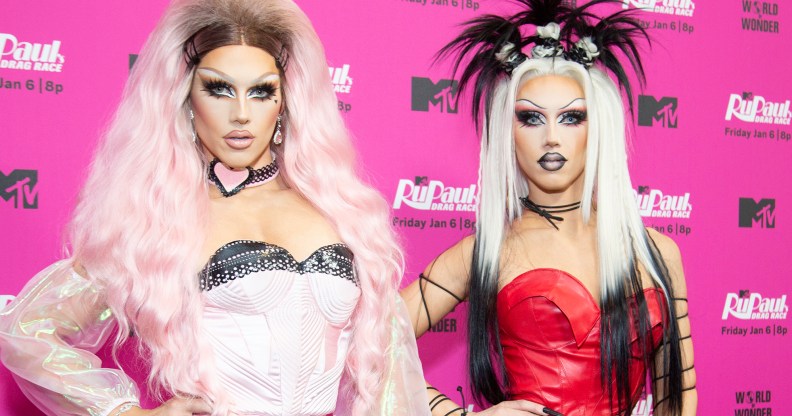RuPaul’s Drag Race: How social media made drag’s subversive art form into a capitalist money maker

RuPaul’s Drag Race season 15 stars Sugar (left) and Spice are two queens who’ve capitalised on social media interest in drag. (Santiago Felipe/Getty)
RuPaul’s Drag Race has become a behemoth with seemingly unstoppable forward motion.
First aired in 2009 and created by production company World of Wonder, the reality show sees drag queens compete to become “America’s Next Drag Superstar”. Since premiering, the show has spawned a business empire with a legion of spinoffs, smartphone apps, thrice-yearly fan conventions and franchised versions in Thailand, Canada, the UK and now Holland.
RuPaul’s Drag Race represents the high watermark of mainstream success for global drag culture. It has had a massive hand in normalising the idea of the drag queen (at least in the American mediascape) and, as analysis of the show’s media empire found, made the art form extremely lucrative. However, that drag could be financially successful and culturally acceptable has not always been the case.
Traditionally, drag has been an unrecognised art form outside of LGBTQ+ spaces, with most drag queens living on the fringes of society. In the United States, for example, “stage queens” who managed to find paying work earned incomes far below the national poverty line. But today, drag is enjoying mainstream success, thanks in large part to the relationship it has developed with commercial social media.
On the fringes
Before the early 2000s, drag culture and the internet developed away from mainstream capitalism. However, both have since been professionalised, giving rise to drag career YouTubers and social media influencers. Their parallel evolution towards highly-polished, branded professionalism has provided the conditions for drag culture’s mainstream visibility. But at what cost?
A major reason for Drag Race’s success is that World of Wonder funnelled core aspects of drag culture into the reality TV format – a format entirely dependent on the low production costs and self-branding affordances of today’s commercialised social media infrastructure.
But historically, drag in America had an ambivalent relationship to capitalism. The radical drag troupe The Cockettes, for example, lived on a commune in San Francisco, put on free performances (some of which explicitly critiqued capitalism), shoplifted costumes and props and collected state welfare.
Other queens – like those in the arthouse documentary Paris Is Burning (1990) and Ryan Murphy’s television series Pose (2018-19) – similarly operated on capitalism’s margins. The drag balls (a competition scene where people, often drag queens, perform different drag genres and categories) portrayed in these productions offered temporary respite from the cultural and economic exclusion queens faced outside queer spaces.
Like drag, the early world wide web was not initially regarded as a means to a career. Instead, it offered vibrant spaces for self-expression and information sharing, from early bulletin board systems to the eclecticism of personal webpages.
But the turn of the 21st century saw the emergence of now-familiar brand names like Facebook, YouTube and Twitter, and the extractive economic models that turned these sites into big money-makers. With this, drag and internet culture became dominated by entrepreneurialism.
Queens of business
It is in this space that Drag Race emerged. A professionalised social media presence is all but compulsory for Drag Race contestants. RuPaul routinely directs viewers to “participate” in the programme through hashtags, and audiences are encouraged to support their favourite finalist similarly. In more recent seasons, the size of online followings is a constant topic of discussion. There are also frequent debates about whether contestants are “social media queens”, who exist solely online, or are “stage queens”.
Moreover, Drag Race contestants frame their social media participation through the discourse of entrepreneurial self-branding. For instance, Jasmine Masters (season 7 and All Stars 3) has said: “Once you’re on [social media], you are a reality celebrity. You are a brand from that point, you know, so you have to treat yourself as a market, as a business.
Masters has in fact mastered the use of social media to self-brand. Despite performing poorly on both of her seasons, she remains a fan favourite largely through the virality of memes produced from her YouTube channel.
Other Drag Race alumni have spun their social media popularity into offline success. Many have prolific careers that include touring, YouTube series, film and television roles, book publishing and even music.
In a Drag Con (the Drag Race fan convention) panel titled “The Business of Drag”, Latrice Royale makes clear that, today, “Drag is not a hobby, it’s a career.” This claim marks a radical departure from the pre-internet drag and highlights the imperative of “work” – or, as they say in LGBTQ+ culture, “werq” – in today’s drag culture.
The significance of the term is vividly captured in fan favourite Shangela’s song Werqin’ Girl, a braggadocio track in which she boasts about her status as a paid professional. The song fetishes hard work and tenacity. And like Jasmine Masters, Shangela foregrounds entrepreneurialism in a way that’s a world away from pre-internet drag in its explicitly anti-capitalist and marginal modes.
While social media has created careers for many Drag Race alumni, as an art form, drag is at its most powerful when it questions dominant arrangements of power. Performers such as The Cockettes and those in Paris is Burning are prime examples.
What our analysis of Drag Race’s media empire – from episode transcripts and contestant interviews to spin-off podcasts, panels and YouTube series – demonstrates is that drag has been girdled by the logic of competitive individualism and the free market. As such, the show’s mainstreaming of drag, as cultural analyst Lisa Duggan notes, perpetuates “a privatized, depoliticized gay culture anchored in… consumption”. A culture that positions drag as an economic vehicle rather as a means of mocking, querying or dismantling dominant power structures.![]()
This article is republished from The Conversation under a Creative Commons license. Read the original article.
How did this story make you feel?

